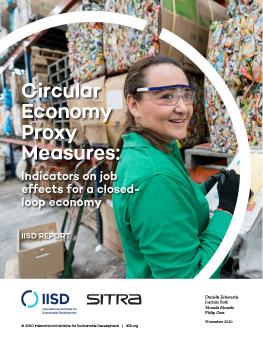
Circular Economy Proxy Measures: Indicators on job effects for a closed loop economy
Indicators on job effects for a closed-loop economy
The six proxy measures to a circular economy examined in this report (material efficiency, waste recycling and reuse, industrial ecology, energy efficiency, renewable energy, and green procurement) present insights into the job trends and job growth potential under a closed-loop approach. All six measures present positive net benefits in job creation (direct and indirect) and induced economic impacts. As a whole, jobs linked to these proxy measures are more labour-intensive than fossil-fuel-related jobs and are able to decouple economic activity from greenhouse emissions.
Six proxy measures were chosen based on their sectoral constitution in material and energy efficiency, recovery, repair, and recycling. Each of these was examined in terms of their potential job impacts based on tracking where they have been implemented as well as research studies on their potential. Findings of the study include:
- Material efficiency has a positive job creation capacity due to three main factors: (1) the profitability of more efficient technologies (innovation); (2) changes in labour productivity; and (3) the foreign value added (meaning the value added of imported inputs that are used to produce products or services designed for export).
- Waste recycling and reuse are closely related to material efficiency. In Europe alone, direct jobs could increase by up to 322,000 and an additional 115 million tonnes of recycled material could be created if a 70% target for recycling was successfully reached. These benefits would trickle down to 160,900 indirect jobs and 80,400 induced jobs.
- Industrial ecology is the concept of creating industrial networks to reduce waste significantly. There is a gap in studies that outline job creation potential within industrial ecology. Nonetheless, due to its micro-level thinking between related industries, it enables positive contributions to economic benefits under a closed-loop approach.
- Energy efficiency is not only one of the most cost-effective ways to save energy and reduce emissions; it is also considered labour-intensive and conducive to a high rate of job creation, particularly in manufacturing, engineering, and construction. In Europe, ambitious energy-efficiency programs could see an estimated potential increase of 0.7 million to 4.2 million new jobs by 2030.
- Renewable energy is on the rise globally, providing not only access to reliable, localized energy supply, but also employing many people around the world. Regarding direct job creation, renewable energy technologies have higher labour intensity than fossil fuels, particularly during the construction and installation phases. Comparing the different technologies, the average renewable energy potential is 0.65 jobs/GWh, moving upward to 0.80 jobs/GWh when energy efficiency is added to the mix. These two are far above the estimated average of 0.15 jobs/GWh for fossil fuel technologies.
- Green procurement enables a circular economy; although the job effects are less easily quantifiable than for other proxy measures, it can support local job creation while providing decent working conditions. Most of the literature reviewed focused on ways governments are able to utilize green procurement to shift goods and service providers’ business models toward a circular economy via government purchasing power.
Participating experts
You might also be interested in
State of the Sector: Critical energy transition minerals for India
This report presents a comprehensive strategy for securing a reliable supply of critical energy transition materials (CETMs) essential to India's clean energy and low-carbon technology initiatives.
Unlocking Supply Chains for Localizing Electric Vehicle Battery Production in India
This study aims to highlight the key supply chain barriers in localizing electric vehicle (EV) battery cell manufacturing in India. It summarizes consultations with 12 companies, as well as experts and policy-makers, to determine the crucial challenges and opportunities in localizing battery manufacturing in India.
Avoiding Trade Concerns in the Design of Plastic Pollution Measures
IISD provides insights on aspects of WTO members' plastics that have created friction with trading partners and suggests recommendations for the adoption of such policies in the future.
Securing India's Copper Supply
This policy brief emphasizes the need for India to develop a comprehensive copper strategy.